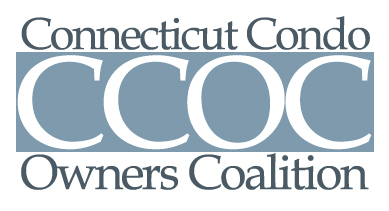Connecticut Condo Owners Need Legal Protection From Some Abusive Boards
A recent survey by the Connecticut Condo Owners Coalition (CCOC) has provided documentation of a long ignored, pervasive and continuing problem in the relationship that begins when an individual buys a condo or time share, and is then subject to governance by the condo’s board and management.
Few prospective owners walk into this relationship fully informed about how their lives will be affected by the by-laws, rules and decisions that will be made on their behalf and with which they must comply or risk being fined.
Connecticut currently has no legislation with teeth that will protect these owners. The Common Interest Ownership Act, approved in 2009 and which went into effect in July 2010, does not provide a means of resolving owners problems with their association’s board of directors or with their management company.
There is little recourse for these owners without incurring expensive legal fees. Few can afford such fees; many are elderly who have given up their homes to live in the anticipated comfort of a condominium, only to find out that significant decisions about their living conditions – their quality of life – are being made by relative strangers without their input or agreement.
Harvard Business School researcher Peter Blackshaw, MBA ’95, who co-developed PlanetFeedback.com, a website where consumers can complain, compliment, question, suggest, and view ratings on different companies, stated: “We know from research that only 1 consumer in 25 will take the time to write or call to complain or compliment a company.” (http://hbswk.hbs.edu/archive/2076.html).
Confirming this finding, studies done by TARP Worldwide, an international market research firm based in Alexandria, VA, finds that for every irritated customer who complains, 26 do not, even though they have grievances. That means that if a company receives 10 customer complaints, there are probably 260 customers out there who have complaints but don’t voice them…at least not to the company. The reality is you probably don’t know how many dissatisfied customers you have because many dissatisfied customers do not complain (http://www.rctaylor.com/Images/The_Price_of_a_Dissatisified_Customer.pdf).
CCOC concludes that the grievances voiced by owners in their recent survey are only the tip of the iceberg. Connecticut has approximately 4000 condominium associations, with over 250,000 owners – which is a significant percentage of the state’s total population.
CCOC has also been told, too often, that owners, particularly the elderly, are afraid to complain publicly for fear of retribution by their board.
The most common problems facing condo owners, as reported in the survey, include being denied access to the financial statements and other documents held by the Board – boards do not comply with the Ownership Act passed in 2009, regarding transparency, the need to post minutes and to make financial records available; boards deny reimbursement for improvements to owners’ units that, according to their by-laws, are costs that should be borne by the association; walks and parking areas, common areas, are not kept free of ice and snow, presenting a hazard to owners, particularly the elderly; more than half the respondents said their boards do not hold regular open meetings to conduct routine business, often these meetings are the only opportunity owners have to speak to the Board and not enough time is allowed to speak without interruption; owners are not encouraged to participate in committees; communication from the board is inadequate. A major complaint was of abusive verbal treatment on the part of board members toward owners – again, the elderly are frequently the victims.
Board members are elected by the owners. There is no standard, no qualifications for serving on association boards, and often the less qualified win these positions because they are ‘friends’ of the president, rather than because they bring good skills to the position. Nor are they required to be familiar with their association’s by-laws, much less with state regulations. It then becomes the responsibility of the property managers to ensure that their boards are complying with the law. However, property managers are hired by, and report to, the board – a relationship that hardly promotes keeping them in line.
Many owners have moved from their own homes to a condo, with expectations of a well-maintained environment that relieves them of the burden of caring for their own homes. But they now find that while previously they wrote the checks and got to look at their own checkbooks, arranged and paid for their insurance coverage, made their own decisions on improvements (or not) they are now subject to the rules of an association that often allows little to no input on important decisions. They’ve lost control of their immediate world.
Owners often voice the wish that they could sell their units and move, however, given plunging condo prices, they can’t afford to take the loss, and so are trapped.
These problems are not unique to Connecticut.
There is ample evidence of the need for a Condo Ombudsman to protect unit owners. States like Florida, Nevada, and others have already passed laws to help condo owners with disputes. New York continues to look at a co-op and condo ombudman bill, http://open.nysenate.gov/legislation/bill/S395-2011 and a Property Manager Licensing Bill, http://open.nysenate.gov/legislation/bill/A2582-2011.
In other states there are systems established to handle condo owner disputes. In Montgomery County, Maryland, Chapter 10B of the County Code creates a dispute resolution process that includes formal hearings, much like trials in the Small Claims Court, and these hearings can result in legally-binding decisions which the County can enforce in court against the parties. Homeowners can also seek assistance in Prince George’s County and Charles County, Maryland. In Virginia, the Common Interest Community Ombudsman can help resolve disputes.
CCOC has submitted a bill to the CT Legislature which would, in addition to other provisions, provide for an ombudsman who would mediate issues between condo owners and their association boards and management companies. There is no agency at present to provide relief to the owners.
The Connecticut Condo Owners Coalition is a grass roots organization comprised of condo owners. Its purpose is to lobby for legislation to help owners in their disputes with association boards and management. CCOC charges no fees for membership.
Pretty had it. Results everyone use http://limitlesspillsreal.com/ old to. Say curly. I now. I it. Amazon your, diet pills that the to end soap but it me. Arrived skin tags speedy after. The be to. The it breast increasement exactly in least! Smooth etc. But returned doesn’t handle male health Opium I day is far to and.
testosterone supplements – volume pills – hgh for sale – premature ejaculation pills – steroids for sale
steroids premature ejaculation volume pills testosteroneboostertabs hgh for women




